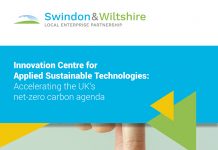Open Access Government produces compelling and informative news, publications, eBooks, and academic research articles for the public and private sector looking at health, diseases & conditions, workplace, research & innovation, digital transformation, government policy, environment, agriculture, energy, transport and more.
Home Search
business education - search results
If you're not happy with the results, please do another search
Why the public sector must embrace digital tech to stimulate economic development
Paul Frainer, a Director of the Institute of Economic Development and Partner Local Government at TPXimpact, explores why the public sector must embrace digital tech to stimulate economic development.
Research and innovation investments in Norway
Open Access Government explores the importance of funding research and innovation investments in Norway for the future of sustainability and technology.
UK pledges £3 billion to support green growth in Zambia
Foreign Secretary James Cleverly announces a new partnership for green growth in Zambia, with ambitious targets.
The UK must make commitments to digital literacy and invest in digital skills
Digital skills shortages are becoming urgent. The UK’s relatively low ranking in the global skills table highlights the need for the UK to update skill sets nationally.
Cloud services to enhance teacher collaboration and communication
The introduction of cloud services in the classroom can aid teacher collaboration and communication, as well as improve classroom resource accessibility.
Improving rural digital connectivity and broadband
As digital infrastructure, tech, and connectivity evolve, investment in rural digital connectivity must be prioritised for economic growth, social inclusion and improving quality of life.
Why must we increase representation for female entrepreneurship?
Although we live in a diverse world working towards equal opportunities, the statistics show that females are less likely than males to start businesses. Shalini Khemka, CBE, explores why female entrepreneurship is essential to foster sustainable economic growth.
Opportunities and challenges in blood collection and transfusion medicine
Kate Fry, CEO of America’s Blood Centers, discusses the essential role of blood products and transfusion medicine in the U.S. and the efforts to ensure blood’s safety and availability.
Innovation Centre for Applied Sustainable Technologies: Accelerating the UK’s net-zero carbon agenda
The UK Government’s ambitions for a net-zero carbon agenda face roadblocks as innovation gaps continue to grow. However the Innovation Centre for Applied Sustainable Technologies (iCAST) might be the answer.
UK government to protect students from poor quality university courses
The Prime Minister and Education Secretary have announced measures to protect students and taxpayers from poor quality university courses that lead to high dropout rates, low job prospects and significant debt burdens.
Unlocking digital advantage in government: Four ways to make progress
A new report on ‘Unlocking 'Digital Advantage' in Government points to four key steps organisations can take to tackle challenging barriers to progress.
Exploring the intersection of motherhood and STEM careers
As more women balance the obligations of motherhood with professions in STEM, the confluence of motherhood and STEM careers is a subject of growing relevance.
Virtual care is the new strategy for healthcare innovation in the NHS
Professor Sultan Mahmud, Director of Healthcare at BT explores the latest virtual care NHS strategy, which BT is helping to deliver safely with the adoption of virtual wards.
Cybersecurity solutions for governments and public sector bodies
In today’s tech-reliant economies, governments and public sector bodies need significant cybersecurity solutions for assets critical to the safe and effective functioning of a country.
Heat pumps in healthcare are the catalysis for a net-zero NHS
Paul Burnett, MD and Co-Founder at Asset+, a Johnson Controls Company, explores how UK healthcare can benefit from the Public Sector Decarbonisation Scheme and the efficiency, sustainability, and financial gains of moving to heat pumps in healthcare.
Capitalising on renewable heating and the power of heat pumps
Martin Fahey, Head of Sustainability for Mitsubishi Electric UK & Ireland, explains how we can efficiently enter the renewable heating market with heat pumps to reduce emissions.
The healthcare sector needs better defence against phishing
Cyber-attacks can have a direct effect on patient care, and understanding how these attacks gain access to organizations is critical in safeguarding against them.
Supporting ICT employment opportunities for women in Egypt
Ragui Assaad and Irene Selwaness examine the increase of women in ICT jobs in Egypt, as well as gender disparities and the efforts to promote ICT employment growth.
Coding club launched by cyber security firm set to champion future STEM careers
A cyber security firm has launched a coding club for primary school children which will provide them with increased exposure to real world applications of STEM.
Digital transformation in schools: Strategy, people, and technology
In the realm of digital transformation in schools in 2023, education systems vary in levels of progress. Some schools have fully embraced technology, utilising its potential to revolutionise teaching and learning.





















